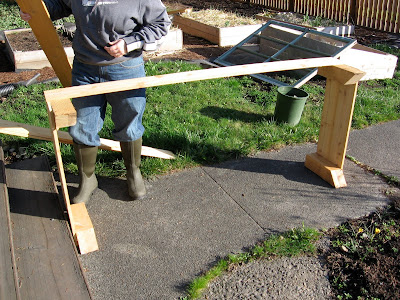There are few moments in urban life that really make you feel like the rest of the world would acknowledge your aggie abilities. Growing parsnips proved to be one of those moments for me. Let me backtrack to the beginning.
I started out growing cacti and succulents in pots way back when all I had was an apartment window or a tiny balcony. Something special happened when I grew my first pot of tomatoes in one of those apartments, and I haven't stopped looking for places to plant veggies since. I've had a couple of p-patches and a couple of houses, and each time I start a new garden, I stick with safe, predictable plants. Somehow they rarely thrive. Do I not have a green thumb? To be honest, growing vegetables in pots can be difficult. They need frequent watering and fertilizing, and you can't leave them unattended for a long weekend if it's going to be hot. I've seen some people have success with potted veggie gardens, but those folks are smart enough to grow their plants in big tubs. Itty Bitty did a great post about this very subject not so long ago. But growing veggies in the soil, raised be or no, can be tough, too.
What was I doing wrong all those years? Why did some plants outperform others? How come my tomatoes always ended up with blossom end rot? And why don't carrot seeds sprout in real life like they do in magazines?
The answers to those questions fall into two categories. For the sake of readability, I'll split them up into theories.
Theory #1
Gardening is not a single year activity. Whether you grow things in pots, raised beds, hanging baskets, neat little rows, or by the acre, improvement in soil composition will have the biggest impact on your plants' performance. For the first time in my life as a farmer, I am beginning to understand how important caring for my soil really is. Tomatoes need calcium and magnesium. Without these essential minerals, blossom end rot will cover every tomato on every vine. Though the soil in those p-patch plots was wonderful, rich, organic soil, everyone had grown tomatoes in it, and no one had put those minerals back.
Hint: If you raise chickens like we do, you'll have an abundance of egg shells to deal with, and egg shells are a fantastic source of calcium and magnesium. When you throw them in the compost, they take forever to break down. Instead, collect a bunch of shells (I read one account of a guy who kept a big jar by his sink for just that purpose), crush them into smaller pieces, and throw them in the oven to dry out. There's no need to spend time baking egg shells by themselves, just keep them handy and put them in the oven while you're baking other things or while the oven is heating up and cooling down. Once they're totally dry (white egg shells will take on a slightly golden hue), crush them into a chunky powder with a mortar and pestle. Sprinkle this fairy dust around the base of your tomato plants.
Our chickens have also taught us a lot about compost. I used to compost for fun, but I never had all the browns and greens to make a good, hot pile. Those days are over! Now we always have one batch resting while another is being turned. Sometimes two batches are getting turned at once! Each bin loads up the wheelbarrow about seven times, which is the equivalent of about 15 to 20 cubic feet of finished compost. We use all of that compost in our raised beds and as high-nutrient mulch for the bedding plants around the house. Read more about our composting here.
My point is that gardening doesn't take place in the spring or summer or fall, but it is a year-round entity in need of a lot of attention. Once I started spending a little time caring for our soil, everything began to grow as I had imagined it.
Theory #2
Pick easier plants to grow. How many years did I cry over some exotic plant that didn't survive? Why did I try so hard to grow tomatoes from seed when there are so many great places to buy starts? I make things hard on myself, but I'm learning to change that. By expanding the variety of things I grow into more reliable plants, I'm having more success. I'm also getting to try out veggies I've never eaten before, and it's a lot of fun!
I tried parsnips for the first time a few years ago when Aimee and I were visiting her family in Ireland. Her mother made carrot and parsnip mash. I fell in love. When we came home, I vowed to buy some parsnip seeds and give it my best shot. I was afraid they'd be slow to germinate or prone to split like all the carrots I'd ever grown, but that didn't stop me from planting them. Here's the result.
That's right, folks. I'm a farmer. Check out my parsnips. Each one weighs almost a pound.
As for germinating carrot seeds, I recently read that covering carrot seeds with a board after you water them will help keep the soil moist until those little suckers sprout. Getting carrot seeds to sprout is the real battle, so I'm looking forward to trying out that neat suggestion. After all, if I can grow rockin' parsnips...




















